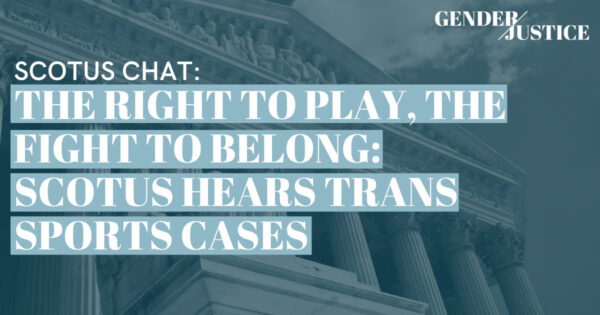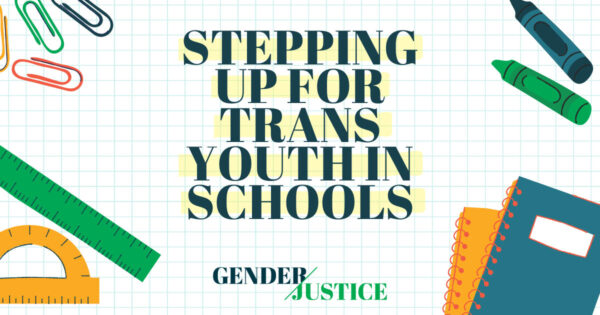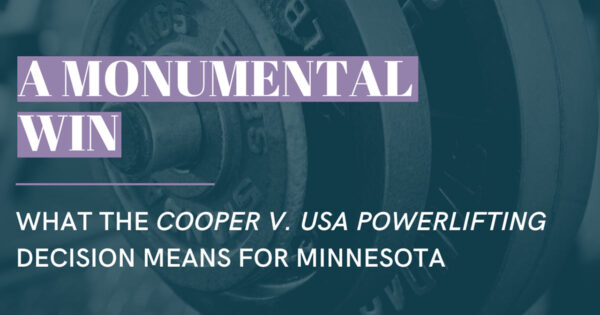
This story was originally featured in our 2025 Spring Newsletter. To read the full newsletter and learn more about our work, click here.
At first glance, the conversation around trans inclusion in sports might seem complicated. But when we look closer, this issue isn’t simply about who gets to compete—it’s about something bigger: who has the power to define fairness, identity, and freedom for all of us. And allowing politicians to decide whose bodies, identities, and rights deserve protection sets a troubling precedent for all of us.
At Gender Justice, we envision a society where everyone—regardless of gender identity or expression—can thrive free from discrimination. As a proudly feminist organization, we believe in rejecting harmful stereotypes and dismantling the confining boxes society tries to place us in—whether around gender, race, ability, or any other factor limiting our potential. Our work is about expanding opportunities and ensuring everyone has the freedom to live their full and true lives.
Who’s Driving the Anti-Trans Backlash—and What’s Their Goal?
The recent wave of anti-trans sports bans isn’t happening by chance. It’s part of a carefully orchestrated campaign led by the same far-right groups that have long targeted reproductive freedom. These groups have poured untold sums into spreading fear, misinformation, and divisive rhetoric. In the 2024 election cycle alone, they spent over $215 million on anti-trans political ads designed to stir panic about trans athletes and pronouns.
When Trump returned to office, one of his first actions was to target trans people—a move echoing troubling historical patterns. Authoritarian and far-right regimes have often scapegoated vulnerable groups to consolidate power, distract the public, and fracture solidarity among communities who would otherwise unite against injustice. Targeting trans people isn’t just about trans rights—it’s part of a broader strategy to erode democratic protections and divide movements for equality.
Why trans people? Because their very existence challenges rigid, traditional gender norms many of us grew up accepting without question—norms that are central to the vision of white Christian nationalism. This ideology seeks to align our laws and society with conservative religious beliefs, enforcing strict gender roles, marginalizing LGBTQ+ identities, and excluding or erasing those who don’t conform.
Trans identities reveal the possibility of a world beyond narrow gender roles, and that possibility threatens the social order the far-right seeks to impose. By targeting trans women athletes, the far-right aims to pit women against each other, reinforcing harmful stereotypes that portray cisgender women as weak and trans women as threats. It’s a calculated attempt to fracture solidarity and dismantle the broader fight for gender equality.
We’ve Seen This Before: Sports and the Politics of Exclusion
History reminds us that exclusion in sports is nothing new. From barring Black athletes in professional leagues to quotas limiting Jewish participation, we now recognize these moments as shameful—driven by prejudice, not fairness.
Today, trans athletes are the newest target. Under current bans, any girl whose body, voice, or appearance doesn’t neatly match stereotypes about femininity could face humiliating and invasive tests simply to participate. Young women, especially those of color or whose bodies don’t align with restrictive definitions of white femininity, would be the first to face suspicion. We’ve already seen this happen to athletes like Caster Semenya, whose career has been disrupted by invasive scrutiny rooted in racial and gender biases.
Imagine your daughter, granddaughter, or niece denied the opportunity to compete—not because of her talent or commitment, but because someone else decided she wasn’t “feminine enough” to belong. For many, this humiliating treatment would discourage participation altogether, robbing them of the joy, confidence, and connection that athletics provides. These policies undermine decades of feminist advocacy that made sports a powerful space for empowerment and inclusion.
Banning Trans Athletes Threatens Everyone’s Rights
Allowing politicians to define who qualifies as a “valid” woman sets a dangerous precedent that extends far beyond sports. As a legal advocacy organization, we see clearly how dangerous this is—and that’s why we’ve taken on cases like JayCee Cooper’s, challenging discrimination in powerlifting.
When politicians gain the power to define gender and identity, they gain the power to decide who qualifies for fundamental rights—like healthcare, employment protections, marriage equality, and reproductive freedom.
We’ve seen this playbook before. Politicians have redefined “personhood,” granting embryos and fetuses rights at the expense of women’s autonomy over their own bodies. The logic behind anti-trans athlete bans is the same: politicians deciding whose rights matter and whose don’t. If lawmakers succeed in excluding trans people from protections, it establishes a dangerous legal precedent that could lead to widespread erosion of personal autonomy.
Who might be targeted next? Same-sex couples seeking marriage equality, workers facing gender discrimination, or individuals seeking contraception? These are not hypotheticals. History has shown us that when politicians get to decide who deserves rights and protections, everyone’s freedom is at risk.
Standing Together: Our Freedoms Are Connected
This isn’t just about sports. It’s about bodily autonomy, equality, and civil liberties for everyone. When we stand up for trans athletes, we’re standing up for a fundamental truth: everyone deserves dignity, respect, and equal rights under the law.
Your support is crucial. And just as importantly, your voice is needed. Help us move the public conversation toward inclusion and empathy. Talk to your friends, family, or coworkers who are still wrestling with what this issue means. Sign our letter in support of trans inclusion in sports, and watch your inbox for opportunities to join an upcoming trans equity training to deepen your learning and sharpen your advocacy.
By standing together for trans inclusion, we build a stronger, more unified movement for justice. The far right is counting on us to be divided. But when we understand that our rights are interconnected—we become unstoppable.
Recent Commentary
- SCOTUS Hears Trans Sports Cases
- How Schools and Educators Can Step Up for Trans Youth
- Three Things to Know About the Landmark Cooper v. USA Powerlifting Win
- Why the ERA Can’t Wait: Voices from the Minnesotans for Equal Rights Coalition
- Fall 2025 Newsletter & Annual Report
- Anti-LGBTQ+ Censorship in Public Schools
- Skrmetti’s Impact on Gender-Affirming Care in MN & ND
- Spotlight: How to Have Meaningful Conversations on Trans Rights
- The People’s Session: North Dakotans Chart Their Own Path
- The Real Priorities of North Dakotans Are Being Ignored
Learn more about the topics on this page
Related Content

SCOTUS Hears Trans Sports Cases
On January 13, 2025, the U.S. Supreme Court heard oral arguments in two pivotal cases about transgender students’ right to participate in school sports: Little v. Hecox (Idaho) and West Virginia v. B.P.J. At the heart of both cases is the question of whether state laws that ban transgender girls from playing on girls’ sports teams violate either Title IX or the Equal Protection Clause of the U.S. Constitution.

How Schools and Educators Can Step Up for Trans Youth
In a special Trans Equity Training this fall, special guest speaker Rebecca Allen — a community leader, recent graduate from the University of Minnesota’s Master of Public Affairs Program, and a proud parent of two — shared her research on best practices for schools to support trans and non-binary students.

Three Things to Know About the Landmark Cooper v. USA Powerlifting Win
On October 22, 2025, the Minnesota Supreme Court issued a historic, unanimous decision in Cooper v. USA Powerlifting. This ruling not only powerfully asserted the rights of transgender athletes to fully participate in sports, it explicitly affirmed transgender Minnesotans’ dignity and place in our state. We invited community members to a briefing breaking down this landmark decision and its impact.

Milestones of Progress
Our organization has celebrated some big wins over the years and we continue to grow in the ways we harness strategic impact litigation, legislative advocacy, and education to push the law forward when it comes to gender equality. Check out what we’ve accomplished, together.